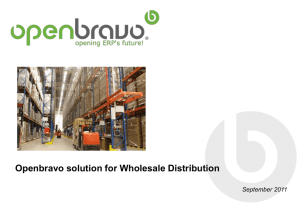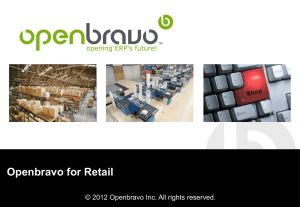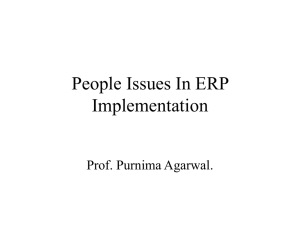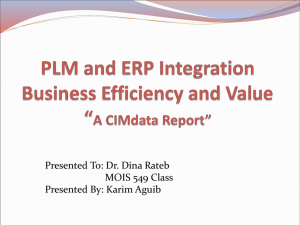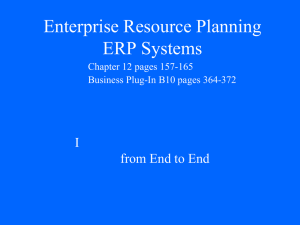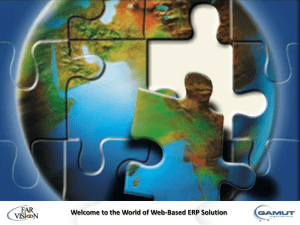Business of Modularity
advertisement
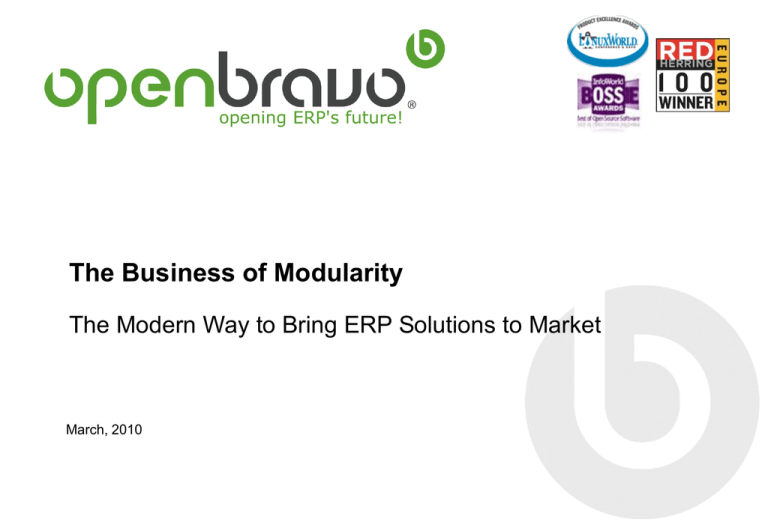
The Business of Modularity The Modern Way to Bring ERP Solutions to Market March, 2010 Agenda Business of Modularity Overview Openbravo Infrastructure Openbravo Exchange / Commercial Considerations Q&A LGL-MOD-The_Business_of _Modularity-1209-JMI Page 2 The Openbravo Open Source Vision Building software in community We believe communities build better software than traditional centralized companies can LGL-MOD-The_Business_of _Modularity-1209-JMI Page 3 The Openbravo Community Vision A different way to build ERP software No single vendor can build a solution that addresses the needs of all companies Vision 1: “Business process optimization” Automate key business processes to help companies be competitive Vision 2: “Data / Information is king” Manage all data reliably and efficiently for better decision making Vision 3: “Empowering people” Optimize worker’s value added through user centric solutions Our vision: “Empowering the ecosystem” An ecosystem with the right skills to build vertical solutions to help companies better manage their businesses LGL-MOD-The_Business_of _Modularity-1209-JMI Page 4 The Openbravo Development Vision Building modular software We know that modern software must be built in a modular way LGL-MOD-The_Business_of _Modularity-1209-JMI Page 5 The Openbravo Development Vision Decentralized developer communities are more productive The Firefox case • The community – 45 full-time developers – 1,000 community code contributors – >20,000 nightly testers and – >500,000 beta testers – >50 million daily users and >125 million total users • > 6,800 third-party add-ons • Number of add-ons before Mozilla’s rearchitecture? – Roughly zero – Compare with Apple Safari and Microsoft IE, which also are weak on community The Openbravo case • The community – 48 full-time developers – > 9.000 registered developers – 11% of the commits are contributed by the community • ~300 projects registered in the Forge – 61 localization projects registered – 122 projects lead independently by community members not related to the Openbravo company A modular architecture is critical to facilitate a decentralized community development process, and create a large pool of 3rd-party extensions LGL-MOD-The_Business_of _Modularity-1209-JMI Page 6 The Openbravo Solution Vision Leveraging an ERP Platform Over 80% of business software is commodity (Master Data, Financials, Purchasing, Sales, Order Processing, Inventory, Invoicing…) Business customers don’t buy commodity ERP platforms, they buy packaged business solutions. LGL-MOD-The_Business_of _Modularity-1209-JMI Page 7 The Openbravo Commercial Vision What is this “Business of Modularity”? A business model that enables fast authoring of ERP software modules and entire vertical solutions… … and that enables the author to make recurring revenue on the software itself (not just the services) LGL-MOD-The_Business_of _Modularity-1209-JMI Page 8 Agenda Business of Modularity Overview Openbravo Infrastructure Openbravo Exchange / Commercial Considerations Q&A LGL-MOD-The_Business_of _Modularity-1209-JMI Page 9 What is modularity The Modularity Ecosystem Infrastructure Modularity • Modular architecture in Openbravo ERP r2.50 - Facilitates distributed development - Reduces time to market Exchange Forge • Marketplace for free and commercial extensions for Openbravo ERP • Platform for collaborative development - For Openbravo ERP - For third party developments - For private projects Central Repository • Distribution mechanism for Openbravo ERP extensions - Functional modules, industry templates, localization packs • Support for Commercial extensions LGL-MOD-The_Business_of _Modularity-1209-JMI Page 10 Modularity Modularity components Concept Description Modularity includes the concept of: • Extension Modules - Base content container. It can include all types of artifacts but Configuration Scripts: Application Dictionary components, Software resources and Reference data. - Modules are the way to add new elements to Openbravo ERP. - However, it cannot modify elements of other modules including core-, to avoid crossed dependencies between them. • Packs - Packs can contain a number of modules developed by different parties - Special packs are localization packs and vertical packs • Industry templates - A combination of packs and a configuration script - Only one per system LGL-MOD-The_Business_of _Modularity-1209-JMI Page 11 Illustrative examples available in the Forge Modularity Existing Extension Modules Tax Report Launcher CIF validator Spanish Professional Localization Mass Advanced Payment Elondra bmSales integration Process Maker BPM integration Hotel Management Module Mass Invoicing Human Capital Management Business Partner Debt Consolidation NIF validator User Tasks Module Direct Debit Form of Payment Orders Awaiting Delivery Report LGL-MOD-The_Business_of _Modularity-1209-JMI Openbravo QuickStart Description Templates Page 12 Accounting Tabs for Transactions Intercompany documents Modularity Illustrative Modules Developed by Openbravo Business Partners Free “as is” Module Commercial Module Hotel Management System • HMS Module for small Hoteliers, including: - Sales Management - Guest Management - Guest Alerts - Message Recording - etc. User Tasks • Allows users to register tasks: - Relate tasks to partners and/or products - Establish deadline - Generates alert after deadline Partners worldwide are starting to use modularity to build extensions that they are listing on Openbravo Exchange LGL-MOD-The_Business_of _Modularity-1209-JMI Page 13 Modularity Additional resources • Introduction to the Openbravo Forge – http://forge.openbravo.com/plugins/mwiki/index.php/Openbravoforgesupport/Help/Introduction – http://forge.openbravo.com/plugins/mwiki/index.php/Openbravoforgesupport/Help/Index • Publishing an Extension Module in the Openbravo Forge – http://forge.openbravo.com/plugins/mwiki/index.php/Openbravoforgesupport/Help/Usage_Mod ules • Developers Guide – http://wiki.openbravo.com/wiki/ERP/2.50/Developers_Guide/Concepts/Modularity – http://wiki.openbravo.com/wiki/ERP/2.50/Extension_Module_Demonstrations_Videos – http://wiki.openbravo.com/wiki/ERP/2.50/Developers_Guide/How_To_Create_and_Package_ a_Module LGL-MOD-The_Business_of _Modularity-1209-JMI Page 14 What is Modularity The Openbravo Forge forge.openbravo.com Description • The Openbravo Forge is the home for the Openbravo projects on-line, including: - the Openbravo ERP core, and… - Extension modules • All the infrastructure to develop modules is freely available on-line - Code repository Forums and news Issue tracker Wiki Modules can be published (obx files for commercial modules are protected from free download) - It is also possible to use third party infrastructure (eg. SourceForge, LaunchPad, … ) and link to them from the Openbravo Forge • Openbravo Business Partners have the added benefit of being capable to register private projects - Eg. To develop a project together with a client - Partners can invite other members that are not necessarily business partners (eg. Clients) LGL-MOD-The_Business_of _Modularity-1209-JMI Page 15
